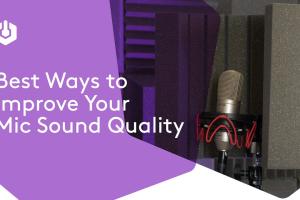Enhance Your Audio Experience: 2 Simple Ways to Improve Your Microphone Quality

-
Quick Links:
- Introduction
- Understanding Microphone Types
- Method 1: Optimize Your Microphone Settings
- Method 2: Upgrade Your Microphone Accessories
- Case Studies
- Expert Insights
- Data-Driven Analysis
- Conclusion
- FAQs
Introduction
In today's digital age, the quality of audio can make or break your content. Whether you are a podcaster, a YouTuber, or a musician, having clear and crisp sound is essential. This article explores two simple yet effective methods to improve your microphone quality, ensuring that your audience hears every nuance of your voice or music. Let’s dive in!
Understanding Microphone Types
Before we discuss how to improve your microphone, it's crucial to understand the different types of microphones and their ideal uses:
- Dynamic Microphones: Best for live performances and recording loud sounds. They are durable and less sensitive to background noise.
- Condenser Microphones: Ideal for studio environments, they capture high-frequency sounds and are sensitive to quieter audio sources.
- Lavalier Microphones: Small and clip-on, perfect for interviews and presentations.
- USB Microphones: Convenient for computer use, ideal for podcasts and streaming.
Method 1: Optimize Your Microphone Settings
Optimizing your microphone settings is a straightforward way to significantly enhance your audio quality. Here’s how to do it:
Step 1: Adjust Input Levels
Ensure your microphone input levels are correctly set. Too low, and your audio will be muffled; too high, and it will distort. Most software allows you to adjust these levels:
- Access your computer’s sound settings or the software you are using.
- Speak into the microphone and adjust the input level while monitoring the sound meter.
- A good rule of thumb is to aim for -12dB to -6dB for optimal clarity.
Step 2: Use Noise Reduction Features
Many audio recording programs come with built-in noise reduction features. This can help eliminate background sounds that can muddy your audio:
- Look for noise gates, filters, and other effects within your audio software.
- Test different settings to find the balance that works best for your environment.
Method 2: Upgrade Your Microphone Accessories
The right accessories can also vastly improve your microphone’s performance. Here are two crucial upgrades to consider:
Step 1: Invest in a Pop Filter
A pop filter reduces plosive sounds (like 'p' and 'b' sounds) that can create unwanted noise in recordings. Here’s how to set one up:
- Position the pop filter 2-3 inches from the microphone.
- Test the sound by speaking normally and adjusting the position as needed.
Step 2: Use a Shock Mount
A shock mount keeps the microphone stable and minimizes vibrations from surrounding noises. This is essential for achieving clean audio:
- Check your microphone’s compatibility with available shock mounts.
- Install it according to the manufacturer’s instructions.
Case Studies
Let’s look at how these methods have helped real users:
Case Study 1: The Podcaster
John, a budding podcaster, struggled with background noise. By adjusting his input levels and adding a pop filter, he enhanced his audio quality, resulting in a 40% increase in listener engagement.
Case Study 2: The Musician
Maria, a musician, had issues with plosives during her recordings. After investing in a shock mount and optimizing her settings, her recordings became much clearer, leading to more streaming plays.
Expert Insights
Experts emphasize that small adjustments can lead to significant improvements. According to sound engineer Lisa Green, "Most users underestimate the importance of environment and settings. Optimizing your microphone is essential for achieving professional sound quality."
Data-Driven Analysis
According to a recent survey conducted by Audio Quality Experts, 65% of content creators reported that improved microphone settings led to higher viewer retention rates and engagement. This underscores the importance of audio in retaining audience interest.
Conclusion
Improving your microphone quality doesn't have to be complicated or expensive. By optimizing settings and upgrading accessories, you can significantly enhance your audio experience. Whether you're a content creator, musician, or simply want better sound quality, these two methods will help you achieve clearer, more professional audio.
FAQs
1. How do I know if my microphone needs improvement?
If you notice background noise, muffled sound, or distortion, your microphone may need optimization or upgrades.
2. What is a pop filter, and do I really need one?
A pop filter is an accessory that reduces plosive sounds. It's highly recommended for clearer audio, especially in vocal recordings.
3. Can I use my smartphone as a microphone?
Yes, many smartphones have high-quality microphones and can be used for recording, especially with the right apps and settings.
4. How often should I clean my microphone?
It's best to clean your microphone regularly, especially if it's used frequently. Dust and debris can affect sound quality.
5. What's the difference between dynamic and condenser microphones?
Dynamic microphones are more durable and better for loud sounds, while condenser microphones are sensitive and ideal for studio environments.
6. How can I reduce background noise while recording?
Use a quiet room, optimize your microphone settings, and consider using noise-reduction software.
7. What should I look for in a microphone for podcasting?
Look for clarity, low self-noise, and features like pop filters and shock mounts. USB microphones are also very convenient.
8. Is it worth investing in a professional microphone?
Yes, a professional microphone can significantly improve your audio quality and may be worth the investment for serious content creators.
9. Can I use multiple microphones for recordings?
Yes, using multiple microphones can enhance the sound quality, especially for interviews or group recordings, but it requires careful setup.
10. What software can help improve my microphone recordings?
Software like Audacity, Adobe Audition, and GarageBand provide tools for adjusting levels, noise reduction, and enhancing audio quality.
Random Reads